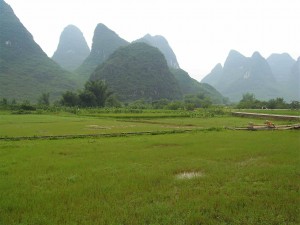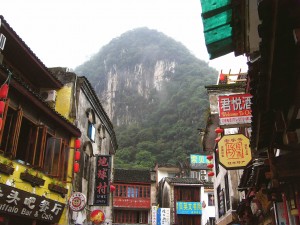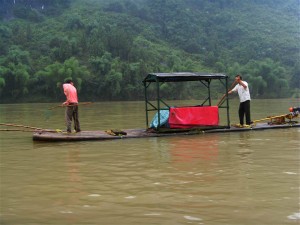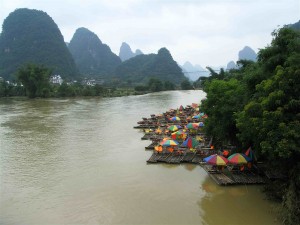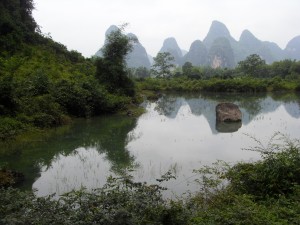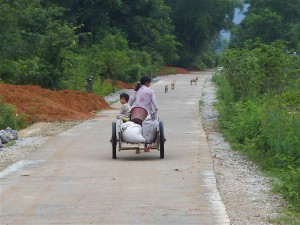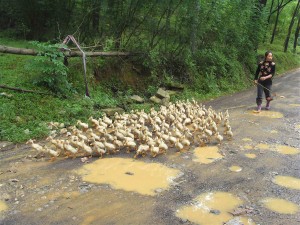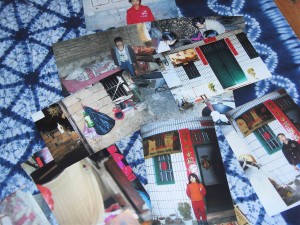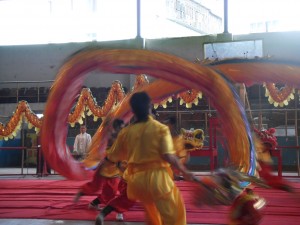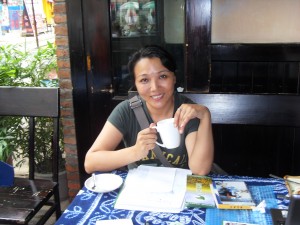Thank you for your interest in this site. Please note that all images are copyright protected and not available for use without permission. Please contact journeys@tenthousandcranes.com for any inquiries about the information contained in this site.
__________________________________________________________
My departure from Hong Kong in the SE of China sent me west out of adjacent Shenzhen, the much-touted area that was tiny fishing villages just several years back before becoming a bustling early success story of China’s economic boom. I boarded my first overnight sleeper train and headed for Guilin in hard sleeper births of six people. In that section, there are only sleeper births, no seats, and one is intermixed with other travelers in these mini dorm sleepers. The trains are actually quite an excellent mode of travel and I found this first one clean and comfortable, though squat toilets on a moving vehicle while fumbling for folded tissue in one’s pocket is an experience not for the timid.
Guilin lies in Guangxi Province amidst spectacular karst topography, created when water, dissolution, and erosion leave unique geologic features such as peaks or sinkholes. In Guangxi Province, it is the vertical peaks standing like green-robed chess players amidst the landscape that are breathtaking. Because Guilin has become quite touristy, I boarded a bus and headed through the countryside to the picturesque Yangshuo, a must on anyone’s journey to China.
The bus ride took me through agricultural expanses that seem to blanket all of southeast and south central China. My earlier comment about the driving etiquette seen in Hong Kong was instantly tossed out the window once we crossed into Mainland China. It became apparent that yellow lines are merely decorative features to breakup the long span of black asphalt, that the horn is the prime navigational tool, and that it is possible to fit sideways one water buffalo, one old man and cart, one motorcycle carrying three, a tourist bus, and a car all pointed one direction while an array of the same attempt to go the opposite direction on what would otherwise be called a single-lane, two way road. One must occasionally dodge the small vegetable stands set up along the roadside, but somehow the whole array of motion seems to swerve in unison like hand-holding ice skaters and continue on their march forward. I found it best to just look at the agriculture.
Yangshuo was just recovering from a flood that moved anywhere from 2 feet to 7 feet of water down the city streets and raised the river level to flood proportions. Poor China has had a slew of natural disasters of recent, but I must say the town has taken all in stride.
The waters have receded, but while on a river cruise, I saw all sorts of trash and clothing pieces embedded high in the brush and trees, recent transports from upriver swept from homes and yards in a flurry of angry waters. Persistent rain has taken its toll on the southeast and a local dam was forced to release waters down its spillway, adding to the already swollen Li River, but apparently a lesser catastrophe than having the dam overtop itself under less controlled circumstances.
Despite the water, this was a charming town. It’s old downtown reminded me of Aguas Caliente, Peru, the touristy but quaint town at the base of Machu Picchu, dotted with hotels that appeal to backpackers, and lined with tempting but probably overpriced tourist shops. I succumbed to only a few !
The Li River winds its way through the karst topography in ways that earned it a place on one of the yuan bills. While drifting down the Li on handmade rafts, I was tapped on the shoulder by our guide/driver/pilot who proudly pointed downriver and then to the yuan note held in his hand. We were indeed at that same noteworthy spot and the pride of China was reflected in his grin.
It was hard to imagine I was in that part of China that lends itself so well to those postcards depicting farmers in pointed hats wading through their rice paddies with individual mist-shrouded mountains framing the background. But we indeed biked through these living postcards, past water buffalo sludging through muddy fields while farmers spoke to them in voice and gesture as comfortably as if speaking to a family member at home. It worked, for the beasts obeyed and turned upon command. We passed fields of wading men and women hunting for snails, a delicacy I have declined.
An afternoon cooking class found me in a room with about ten others, each of us at our own workstation complete with wok. The cooking adventure had begun with a tour through one of the local markets, a sort of indoor farmers market complete with vegetables, fruits, live swimming and clucking creatures, and other staples of the local diet. These markets are always a marvel to behold and evoke times when food was always fresh.
The wok experience was great fun and we had an absolutely wonderful young fellow instructing us on recipes, proper chopping technique, and wok flame control, an art in and of itself. We cooked four or five different dishes and then dined on the results, eating outdoors overlooking the karst countryside.
On our last morning in Yangshuo, we were treated to a special experience, one reminding me of my previous experience in Hong Kong with the women of bez & oho. Seems a husband and wife team have opened their hearts and home to 43 or so orphans, abandoned children, or otherwise seriously impoverished youth. Mike has long been a kung fu master and had begun offering free kung fu training to some of these local youth as a way for them to find a footing in life and chart some sort of future for themselves. With his wife Amanda’s assistance, the two turned this offering into a multipronged program: one a residential/school facility for orphans and the other a martial arts training program that has morphed into a performing arts program.
The children range from 3 to about 17 in age. If they were not “registered” at birth, they cannot access health care or education, and many of these children have fallen between the cracks. Angel’s Home offers love, training, and respite from an otherwise unrelenting world of poverty and Amanda has dedicated her recent years to making this possible for many of the area’s abandoned. Mike has trained many of the mostly young men in the finer martial arts and these boys (and one young girl!) put on a performance for us to rival any professional show. It was a jaw dropper and we were captivated. Mike did several tai chi pieces and the boys (and the girl) performed a dazzling array of routines involving sword, stick, and kick fighting and a two-person dragon fight, where front and tail end of the dragon were two different boys jumping high on platforms while fighting with another such dragon.
Accompanied by drums and music, this performance was spellbinding and should be seen worldwide. The ultimate beauty of such a performance, however, was not just its choreographed brilliance and level of skill, but the story behind it. Each of these young people has stood with one foot dangling over a great abyss and that they have come so far and acquired such a finely honed skill and life purpose is just an exquisite expression about the good that can be grasped in this world.
After the performance, Mike gave us a taste of what his young protégées had been through by putting us through the paces of an hour-long tai chi lesson that had us dripping. He’s a master at what he does, as was reflected in the grace and power of each move and gesture. Later that day, I spent several hours interviewing Amanda to learn more about the children and Angel’s Home. That is a story still in the making for me, but Amanda and I bonded and shed tears together as we discussed the bittersweetness of Angel’s Home.
Image is of Amanda, sipping tea.
And then I was off to catch another train.
Travel and Info Tips:
Yangshuo Cooking School: http://www.yangshuocookingschool.com/index.html
___________________________________________________________________________________

